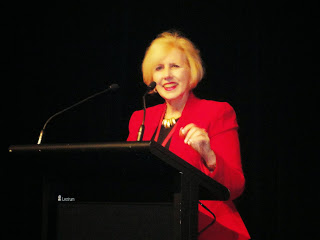Once Again We Must Ask –What business are we in?
Over the years when speaking to library and knowledge management audiences, I have often invoked the importance of knowing what business we are in.
,I became a librarian because “I loved books.” Yet on the day when I started my first law library job, a hulking piece of equipment was rolled through the door of the Pace University Law Library. This was an omen, like a comet across the night sky, my career path would pivot in unforeseeable directions. The Lexis DeLuxe research terminal was the size of a washing machine, and it connected to Mead Data Central computers in Ohio via a dial-up modem. This “state of the art” equipment provided access to Ohio statutes and cases. Within 10 years the Lexis and Westlaw WALT terminals would shrink, the World Wide Web would be born and the stacks of books would be compressed into bits of data accessible on everyone’s desktop.

I love the “Black & Decker marketing strategy that recognized that their customers “don’t want a drill they want a half-inch hole in a board.” And librarians who thought lawyers and law firm administrators only needed books became flotsam in a surging tide of technology. Librarians and knowledge managers need to be aligned with what lawyers really need and that they have the unique expertise to deliver: information that gives them a competitive edge, new clients, happy clients, predictive and actionable insights , efficient workflow, and tools that make their lives easier. (Read the full post at Legal Tech Hub)
Seizing the Technology of the DayContinue Reading AI and the Future of Law Libraries : Opportunity or Armageddon
 f law library and technology thought leaders to contribute to her new book “Law Librarianship in the Age of AI” which was released last week by the American Library Association.
f law library and technology thought leaders to contribute to her new book “Law Librarianship in the Age of AI” which was released last week by the American Library Association.


